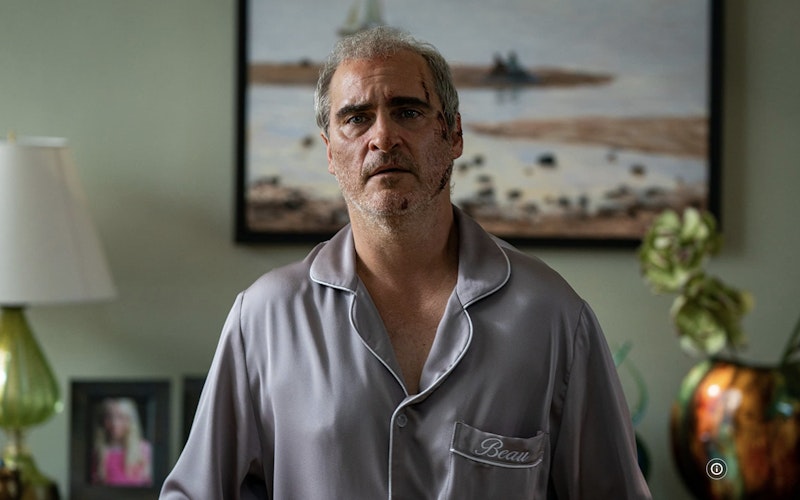
Movies
The Anxiety of Conditional Love in Beau Is Afraid
Editor’s note: This post contains spoilers for Beau Is Afraid.
Poor Beau was just trying to get to the airport.
In director Ari Aster’s Beau Is Afraid, the eponymous Beau (Joaquin Phoenix) experiences a chain of increasingly horrifying events after his keys are stolen from his apartment door, causing him to miss a flight to his mother’s home. Wracked with fear at the idea of his keys in the hands of an unknown intruder, an anxious Beau calls his mother, Mona (Patti LuPone), to seek advice.
“It’s not safe, right?” Beau asks, his eyes darting and his bald forehead shiny with anxious sweat.
Mona is clearly perturbed. Here she’s been eagerly awaiting a visit from her son and now he upends their plans because of some missing keys? Her voice thick with malicious martyrdom, Mona replies, “I’m sure you’ll do the right thing, sweetheart.” For Mona, the correct course of action seems clear: her son should abandon his unlocked apartment and hop on the next flight. That is what a good, loyal child would do for the sake of his mother—and she’s been such a good mother.
Beau hangs up, his eyes now feverish with guilt.
In this surrealist dark comedy, the environment Beau inhabits is one of endless threat. Vicious and profane graffiti mark the walls of his rundown apartment building, in which the elevator doors send out sparks when they open, the water unpredictably shuts off, and deadly brown recluse spiders scurry along the dirty floor. Outside, the street pulses with chaos: screaming men brandish knives and trash piles up under buzzing neon sex shop signs. Even a few decaying bodies lay abandoned in the road. In all this Beau’s closest companion is his therapist (Stephen McKinley Henderson), who prescribes Beau pills to keep his proverbial anxiety at bay.
In this dismal and dangerous world the threats are so overblown one wonders whether they exist within reality or only in Beau’s mind. If so, what happened to Beau that caused him to perceive the world and its inhabitants as so menacing that it demands a perpetual fight or flight response? Through flashbacks to Beau’s youth, one thing becomes clear: Mona was a deeply smothering mother whose obsessive attention to Beau left him emotionally stunted. Mona views her journey through motherhood as one of extreme self-sacrifice, care, and love—and when she does not sense appreciation for such maternal nobility from her son, she retaliates by withholding love and acceptance.
In this surrealist dark comedy, the environment Beau inhabits is one of endless threat.
So, where does this leave Beau? Paranoid, afraid, and at the mercy of a world he perceives to be out to hurt him. This is the inevitable mindset of a person conditioned to believe the safety net of love will be ripped out from under them at any moment.
Unfortunately, Beau is right: an imperfect world–and an imperfect parent–cannot offer unconditional love. Knowing this, we are apt to fall into a state of resigned doom, recognizing that our earthly relationships cannot be trusted to fulfill the acceptance we long for. Where, then, can this type of empowering love be found? In Romans 5:8, the Apostle Paul assures us that “while we were still sinners, Christ died for us.” This is a remarkable love not contingent upon performance, reciprocity, or the expectation of uninterrupted devotion (such as abandoning your apartment to looters in order to visit your mother).
When we accept such love, we find ourselves more equipped to approach our relationships and circumstances without fear—for we are held by an unending bounty of Christ’s unconditional love, from which even the greatest fear-inducing situations cannot separate us. When we find ourselves aware of this divine gift, the world transforms into a profoundly less-threatening place, for we are free to experience life’s rhythms with confidence, knowing we are secured in compassion and acceptance.
When Beau experiences a version of this love, Beau Is Afraid stylistically transforms. In the second act, Beau stumbles upon a traveling theater production and slowly begins to imagine himself inside the play’s narrative, envisioning himself as a devoted father who both loves and is loved deeply by make-believe sons. Where previously the film reflected a grim but recognizable reality, now Aster and his team employ a combination of animation and live action to evoke a quaint storybook, where even frightening perils such as angry strangers or tidal waves appear hand-drawn and childlike and colorful landscapes suggest the absence of true threat.
This purposefully fabricated and hand-crafted environment is a stark turn from the film’s previous desolation. It’s as though Beau, confronted with the idea of unconditional love, momentarily forgets how terrifying his world can be. Here, Beau is not the nervous man who hides in his apartment, but an empowered paternal hero who will do whatever it takes to find his “lost” sons. In love’s security, Beau’s fear dissipates. In the same way, our own worlds grow less dim and threatening when we receive Christ’s perfect love, for this is the love that drives out fear.
Sadly, the finale of Beau Is Afraid culminates in the inverse: the destructive power of relationships defined by conditional love, which eventually lead to isolation and despair. As sinners in a world that cannot offer unconditional love, is this then our fate as well? No, writes Paul in his letter to the Ephesians, for Christ’s love for us instills in us the power to “be filled to the measure of all the fullness of God,” miraculously free from the burden of fear.
Topics: Movies